-
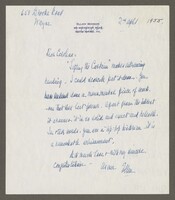 Ellen Winsor letter to Caroline Katzenstein, 2 April 1955
Ellen Winsor letter to Caroline Katzenstein, 2 April 1955 In this letter, prominent Bryn Mawr activist Ellen Winsor congratulates Caroline Katzenstein for completing her book "Lifting the Curtain." Katzenstein's book provides a survey of the women's suffrage movement in the United States and recounts Caroline's own experiences with the campaign in the years leading up to the Nineteenth Amendment.
-
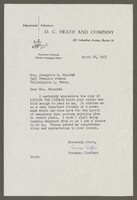 Vincenzo Cioffari letter to Josephine Katzenstein Blancké, 28 March 1955
Vincenzo Cioffari letter to Josephine Katzenstein Blancké, 28 March 1955 After completing her book "Lifting the Curtain," Caroline Katzenstein sent copies to various libraries and personal connections. This letter of receipt is from the publishers D.C. Heath and Company.
-
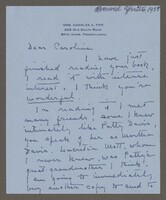 Mary Febiger Fife letter to Caroline Katzenstein, 5 April 1955
Mary Febiger Fife letter to Caroline Katzenstein, 5 April 1955 In this letter, Mary Febiger Fife discusses Caroline Katzenstein's book "Lifting the Curtain," and recounts the people she knew who participated in the women's suffrage movement, including Mary Ingham and Dora Kelly Lewis. Caroline's book surveys the women's suffrage movement in the United States and reports her own experiences within the campaign in the years leading up to the Nineteenth Amendment.
-
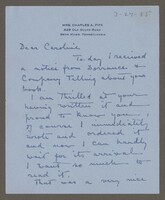 Mary Febiger Fife letter to Caroline Katzenstein, 27 March 1955
Mary Febiger Fife letter to Caroline Katzenstein, 27 March 1955 In this letter, Mary Febiger Fife congratulates Caroline Katzenstein on the publication of her book "Lifting the Curtain." The book provides a survey of the women's suffrage movement in the United States and recounts Caroline's own experiences with the campaign in the years leading up to the Nineteenth Amendment.
-
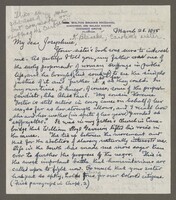 Walton Brooks McDaniel letter to Josephine Katzenstein Blancké, 26 March 1955
Walton Brooks McDaniel letter to Josephine Katzenstein Blancké, 26 March 1955 This letter from Walton Brooks McDaniel, a prominent classicist, to Josephine Katzenstein Blancké, the sister of Caroline Katzenstein, comments on Caroline's book "Lifting the Curtain." The book provides a survey of the women's suffrage movement in the United States and recounts Caroline's own experiences with the campaign in the years leading up to the Nineteenth Amendment.
-
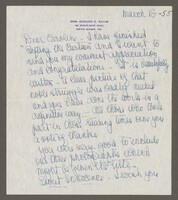 Rebecca Winsor Evans letter to Caroline Katzenstein, 18 March 1955
Rebecca Winsor Evans letter to Caroline Katzenstein, 18 March 1955 This letter, sent from Rebecca Winsor Evans, congratulates Caroline Katzenstein on the publication of her book "Lifting the Curtain." The book provides a survey of the women's suffrage movement in the United States and recounts Katzenstein's own experiences with the campaign in the years leading up to the Nineteenth Amendment.
-
 American Academy of Political and Social Science review of Lifting the Curtain, 1955
American Academy of Political and Social Science review of Lifting the Curtain, 1955 A review of Caroline Katzenstein's book "Lifting the Veil" by the American Academy of Political and Social Science. Katzenstein's book surveys the women's suffrage in the United States and recounts her experiences with the campaign in the years leading up to the Nineteenth Amendment.
-
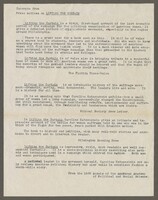 Excerpts from press notices on Lifting the Curtain, 1955
Excerpts from press notices on Lifting the Curtain, 1955 These excerpts are taken from various reviews of Caroline Katzenstein's book "Lifting the Curtain." The book provides a survey of the women's suffrage movement in the United States and recounts Katzenstein's own experiences with the campaign in the years leading up to the Nineteenth Amendment.
-
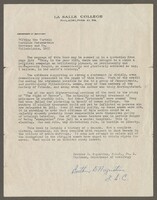 Brother D. Augustine letter to Caroline Katzenstein, 1955
Brother D. Augustine letter to Caroline Katzenstein, 1955 A review of Caroline Katzenstein's book "Lifting the Veil" by Brother D. Augustine, the Chair of the Department of Sociology at La Salle College. Katzenstein's book surveys women's suffrage movement in the United States and recounts her experiences with the campaign in the years leading up to the Nineteenth Amendment.
-
 Alice Paul introduction to Lifting the Curtain, 1955
Alice Paul introduction to Lifting the Curtain, 1955 Alice Paul was one of the most prominent leaders of the women's suffrage movement in the years leading up to the Nineteenth Amendment. She provided the introduction to Caroline Katzenstein's 1955 book "Lifting the Curtain," which surveys the development of women's suffrage in the United States and recounts Katzenstein's own experiences with the campaign.
-
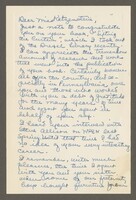 Lillian F. Hack letter to Caroline Katzenstein, undated
Lillian F. Hack letter to Caroline Katzenstein, undated Lillian F. Hack, a student at Drexel University, sent this letter to congratulate Caroline Katzenstein on the publication of her book "Lifting the Curtain." The book is a survey of the women's suffrage momvement in the United States and provides details on Katzenstein's own experiences while campaigning for the Nineteenth Amendment.
-
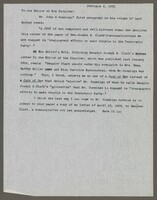 Caroline Katzenstein letter to the editor of The Philadelphia Inquirer, 6 February 1961
Caroline Katzenstein letter to the editor of The Philadelphia Inquirer, 6 February 1961 Caroline Katzenstein, born in 1888, was a leader in the Pennsylvania suffrage movement. She served in official positions for the Equal Franchise Society of Philadelphia, the National American Woman Suffrage Association, and the National Woman’s Party. After the Nineteenth Amendment was ratified, Katzenstein wrote about her experiences in the women's suffrage movement and continued to promote the Equal Rights Amendment until her death in 1968.
This note to the editor of the Philadelphia Inquirer, John M. Cummings, refers to an article in which Katzenstein was mentioned defending Cummings from criticism by Senator Joseph S. Clark.
-
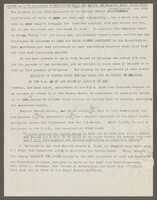 Notes on a TV interview by Charles Shaw with Caroline Katzenstein, 26 August 1960
Notes on a TV interview by Charles Shaw with Caroline Katzenstein, 26 August 1960 Caroline Katzenstein, born in 1888, was a leader in the Pennsylvania suffrage movement. She served in official positions for the Equal Franchise Society of Philadelphia, the National American Woman Suffrage Association, and the National Woman’s Party. After the Nineteenth Amendment was ratified, Katzenstein wrote about her experiences in the women's suffrage movement and continued to promote the Equal Rights Amendment until her death in 1968.
Katzenstein used these notes on a broadcast of Charles Shaw on WCAU-TV to support the Equal Rights Amendment. The transcript calls to attention the Hayden Rider, which was attached to the amendment proposal and effectively nullified the ERA.
-
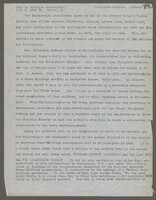 Caroline Katzenstein articles sent to the Smithsonian Institution, 4 January 1960
Caroline Katzenstein articles sent to the Smithsonian Institution, 4 January 1960 Caroline Katzenstein, born in 1888, was a leader in the Pennsylvania suffrage movement. She served in official positions for the Equal Franchise Society of Philadelphia, the National American Woman Suffrage Association, and the National Woman’s Party. After the Nineteenth Amendment was ratified, Katzenstein wrote about her experiences in the women's suffrage movement and continued to promote the Equal Rights Amendment until her death in 1968.
This notice relates to materials from the suffrage movement that Caroline Katzenstein donated to the Smithsonian Institution's Woman's Rights exhibit. Katzenstein provided her delegate's badge to the 1912 Annual Convention of the National American Woman Suffrage Association and campaign pins.
-
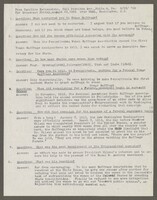 Caroline Katzenstein for broadcast Friday, August 26, 1955, over WMAL, Washington D.C.
Caroline Katzenstein for broadcast Friday, August 26, 1955, over WMAL, Washington D.C. Caroline Katzenstein, born in 1888, was a leader in the Pennsylvania suffrage movement. She served in official positions for the Equal Franchise Society of Philadelphia, the National American Woman Suffrage Association, and the National Woman’s Party. After the Nineteenth Amendment was ratified, Katzenstein wrote about her experiences in the women's suffrage movement and continued to promote the Equal Rights Amendment until her death in 1968.
These notes were drafted in preparation for a broadcast over WMAL in Washington D.C. The questions relate to Katzenstein's motives for supporting women's suffrage and the process of ratifying the Nineteenth Amendment.
-
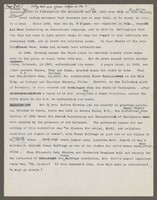 Caroline Katzenstein notes in preparation for broadcast May 10, 1955 over WPEN
Caroline Katzenstein notes in preparation for broadcast May 10, 1955 over WPEN Caroline Katzenstein, born in 1888, was a leader in the Pennsylvania suffrage movement. She served in official positions for the Equal Franchise Society of Philadelphia, the National American Woman Suffrage Association, and the National Woman’s Party. After the Nineteenth Amendment was ratified, Katzenstein wrote about her experiences in the women's suffrage movement and continued to promote the Equal Rights Amendment until her death in 1968.
These notes feature questions and answers regarding Katzenstein's experiences with the women's suffrage movement. Katzenstein begins by briefly describing the nineteenth century origins of the movement in the United States, then goes on to answer questions relating to the activism and fundraising strategies of the National Woman's Party.
-
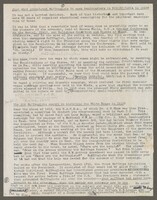 Caroline Katzenstein National Woman's Party publicity notes, undated
Caroline Katzenstein National Woman's Party publicity notes, undated Caroline Katzenstein, born in 1888, was a leader in the Pennsylvania suffrage movement. She served in official positions for the Equal Franchise Society of Philadelphia, the National American Woman Suffrage Association, and the National Woman’s Party. After the Nineteenth Amendment was ratified, Katzenstein wrote about her experiences in the women's suffrage movement and continued to promote the Equal Rights Amendment until her death in 1968.
These notes relate to questions concerning Katzenstein's experiences with the National Woman's Party before the ratification of the Nineteenth Amendment in 1920.
-
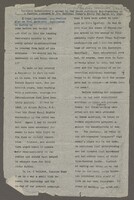 Caroline Katzenstein's appeal to the House Judiciary Sub-Committee at a hearing arranged by the National Woman's Party for March 10, 1948
Caroline Katzenstein's appeal to the House Judiciary Sub-Committee at a hearing arranged by the National Woman's Party for March 10, 1948 Caroline Katzenstein, born in 1888, was a leader in the Pennsylvania suffrage movement. She served in official positions for the Equal Franchise Society of Philadelphia, the National American Woman Suffrage Association, and the National Woman’s Party. After the Nineteenth Amendment was ratified, Katzenstein wrote about her experiences in the women's suffrage movement and continued to promote the Equal Rights Amendment until her death in 1968.
This speech, which relates to the Equal Rights Amendment, was delivered by the National Woman's Party at a House Judiciary subcommittee hearing in 1948.
-
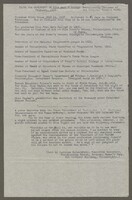 Caroline Katzenstein facts for publicity on Miss Mary H. Ingham, February 1919
Caroline Katzenstein facts for publicity on Miss Mary H. Ingham, February 1919 Caroline Katzenstein, born in 1888, was a leader in the Pennsylvania suffrage movement. She served in official positions for the Equal Franchise Society of Philadelphia, the National American Woman Suffrage Association, and the National Woman’s Party. After the Nineteenth Amendment was ratified, Katzenstein wrote about her experiences in the women's suffrage movement and continued to promote the Equal Rights Amendment until her death in 1968.
These notes discuss the prominent features of Mary H. Ingham's life and career as a suffragist. Ingham, an art history teacher, held senior positions at a number of women's rights groups, including the Philadelphia branch of the National Woman's Party, and participated in many of the NWP's demonstrations.
-
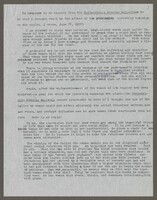 Caroline Katzenstein Philadelphia Evening Bulletin publicity notes, undated
Caroline Katzenstein Philadelphia Evening Bulletin publicity notes, undated Caroline Katzenstein, born in 1888, was a leader in the Pennsylvania suffrage movement. She served in official positions for the Equal Franchise Society of Philadelphia, the National American Woman Suffrage Association, and the National Woman’s Party. After the Nineteenth Amendment was ratified, Katzenstein wrote about her experiences in the women's suffrage movement and continued to promote the Equal Rights Amendment until her death in 1968.
These notes record questions that the Philadelphia Evening Bulletin asked Caroline Katzenstein while she was fighting for women's suffrage in 1917. One of the questions related to the public perception of the picketing campaign of the National Woman Party.
-
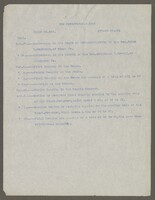 Caroline Katzenstein timeline of "The 1913 Pennsylvania Bill," 23 October 1956
Caroline Katzenstein timeline of "The 1913 Pennsylvania Bill," 23 October 1956 Caroline Katzenstein, born in 1888, was a leader in the Pennsylvania suffrage movement. She served in official positions for the Equal Franchise Society of Philadelphia, the National American Woman Suffrage Association, and the National Woman’s Party. After the Nineteenth Amendment was ratified, Katzenstein wrote about her experiences in the women's suffrage movement and continued to promote the Equal Rights Amendment until her death in 1968.
This document provides a brief timeline of a bill related to women's rights that passed in the Pennsylvania General Assembly in 1913.
-
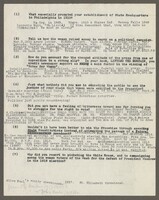 Caroline Katzenstein Nineteenth Amendment publicity notes, undated
Caroline Katzenstein Nineteenth Amendment publicity notes, undated Caroline Katzenstein, born in 1888, was a leader in the Pennsylvania suffrage movement. She served in official positions for the Equal Franchise Society of Philadelphia, the National American Woman Suffrage Association, and the National Woman’s Party. After the Nineteenth Amendment was ratified, Katzenstein wrote about her experiences in the women's suffrage movement and continued to promote the Equal Rights Amendment until her death in 1968.
These notes feature questions and answers relating to Katzenstein's experiences campaigning for women's suffrage.
-
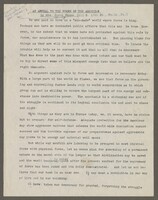 Caroline Katzenstein speech An Appeal to the Women of the Americas, undated
Caroline Katzenstein speech An Appeal to the Women of the Americas, undated Caroline Katzenstein, born in 1888, was a leader in the Pennsylvania suffrage movement. She served in official positions for the Equal Franchise Society of Philadelphia, the National American Woman Suffrage Association, and the National Woman’s Party. After the Nineteenth Amendment was ratified, Katzenstein wrote about her experiences in the women's suffrage movement and continued to promote the Equal Rights Amendment until her death in 1968.
This speech, written under Katzenstein's pen name, Carol Stone, was produced sometime in the early 1940s, right before the United States joined the Second World War.
-
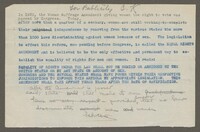 Caroline Katzenstein Equal Rights Amendment publicity notes, undated
Caroline Katzenstein Equal Rights Amendment publicity notes, undated Caroline Katzenstein, born in 1888, was a leader in the Pennsylvania suffrage movement. She served in official positions for the Equal Franchise Society of Philadelphia, the National American Woman Suffrage Association, and the National Woman’s Party. After the Nineteenth Amendment was ratified, Katzenstein wrote about her experiences in the women's suffrage movement and continued to promote the Equal Rights Amendment until her death in 1968.
These speech notes were used by Katzenstein to promote the Equal Rights Amendment. Katzenstein calls to attention the importance of electing officials that sincerely support policies that promote equal rights, and warns of bills that support woman's rights only superficially.
-
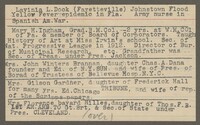 Caroline Katzenstein publicity note cards, 1918
Caroline Katzenstein publicity note cards, 1918 Caroline Katzenstein, born in 1888, was a leader in the Pennsylvania suffrage movement. She served in official positions for the Equal Franchise Society of Philadelphia, the National American Woman Suffrage Association, and the National Woman’s Party. After the Nineteenth Amendment was ratified, Katzenstein wrote about her experiences in the women's suffrage movement and continued to promote the Equal Rights Amendment until her death in 1968.
These note cards provide brief biographies of prominent Philadelphia suffragists; statistics related to gender-based income inequality in high school education positions; and dates for state-level ratification of woman's suffrage.
 Ellen Winsor letter to Caroline Katzenstein, 2 April 1955 In this letter, prominent Bryn Mawr activist Ellen Winsor congratulates Caroline Katzenstein for completing her book "Lifting the Curtain." Katzenstein's book provides a survey of the women's suffrage movement in the United States and recounts Caroline's own experiences with the campaign in the years leading up to the Nineteenth Amendment.
Ellen Winsor letter to Caroline Katzenstein, 2 April 1955 In this letter, prominent Bryn Mawr activist Ellen Winsor congratulates Caroline Katzenstein for completing her book "Lifting the Curtain." Katzenstein's book provides a survey of the women's suffrage movement in the United States and recounts Caroline's own experiences with the campaign in the years leading up to the Nineteenth Amendment. Vincenzo Cioffari letter to Josephine Katzenstein Blancké, 28 March 1955 After completing her book "Lifting the Curtain," Caroline Katzenstein sent copies to various libraries and personal connections. This letter of receipt is from the publishers D.C. Heath and Company.
Vincenzo Cioffari letter to Josephine Katzenstein Blancké, 28 March 1955 After completing her book "Lifting the Curtain," Caroline Katzenstein sent copies to various libraries and personal connections. This letter of receipt is from the publishers D.C. Heath and Company. Mary Febiger Fife letter to Caroline Katzenstein, 5 April 1955 In this letter, Mary Febiger Fife discusses Caroline Katzenstein's book "Lifting the Curtain," and recounts the people she knew who participated in the women's suffrage movement, including Mary Ingham and Dora Kelly Lewis. Caroline's book surveys the women's suffrage movement in the United States and reports her own experiences within the campaign in the years leading up to the Nineteenth Amendment.
Mary Febiger Fife letter to Caroline Katzenstein, 5 April 1955 In this letter, Mary Febiger Fife discusses Caroline Katzenstein's book "Lifting the Curtain," and recounts the people she knew who participated in the women's suffrage movement, including Mary Ingham and Dora Kelly Lewis. Caroline's book surveys the women's suffrage movement in the United States and reports her own experiences within the campaign in the years leading up to the Nineteenth Amendment. Mary Febiger Fife letter to Caroline Katzenstein, 27 March 1955 In this letter, Mary Febiger Fife congratulates Caroline Katzenstein on the publication of her book "Lifting the Curtain." The book provides a survey of the women's suffrage movement in the United States and recounts Caroline's own experiences with the campaign in the years leading up to the Nineteenth Amendment.
Mary Febiger Fife letter to Caroline Katzenstein, 27 March 1955 In this letter, Mary Febiger Fife congratulates Caroline Katzenstein on the publication of her book "Lifting the Curtain." The book provides a survey of the women's suffrage movement in the United States and recounts Caroline's own experiences with the campaign in the years leading up to the Nineteenth Amendment. Walton Brooks McDaniel letter to Josephine Katzenstein Blancké, 26 March 1955 This letter from Walton Brooks McDaniel, a prominent classicist, to Josephine Katzenstein Blancké, the sister of Caroline Katzenstein, comments on Caroline's book "Lifting the Curtain." The book provides a survey of the women's suffrage movement in the United States and recounts Caroline's own experiences with the campaign in the years leading up to the Nineteenth Amendment.
Walton Brooks McDaniel letter to Josephine Katzenstein Blancké, 26 March 1955 This letter from Walton Brooks McDaniel, a prominent classicist, to Josephine Katzenstein Blancké, the sister of Caroline Katzenstein, comments on Caroline's book "Lifting the Curtain." The book provides a survey of the women's suffrage movement in the United States and recounts Caroline's own experiences with the campaign in the years leading up to the Nineteenth Amendment. Rebecca Winsor Evans letter to Caroline Katzenstein, 18 March 1955 This letter, sent from Rebecca Winsor Evans, congratulates Caroline Katzenstein on the publication of her book "Lifting the Curtain." The book provides a survey of the women's suffrage movement in the United States and recounts Katzenstein's own experiences with the campaign in the years leading up to the Nineteenth Amendment.
Rebecca Winsor Evans letter to Caroline Katzenstein, 18 March 1955 This letter, sent from Rebecca Winsor Evans, congratulates Caroline Katzenstein on the publication of her book "Lifting the Curtain." The book provides a survey of the women's suffrage movement in the United States and recounts Katzenstein's own experiences with the campaign in the years leading up to the Nineteenth Amendment. American Academy of Political and Social Science review of Lifting the Curtain, 1955 A review of Caroline Katzenstein's book "Lifting the Veil" by the American Academy of Political and Social Science. Katzenstein's book surveys the women's suffrage in the United States and recounts her experiences with the campaign in the years leading up to the Nineteenth Amendment.
American Academy of Political and Social Science review of Lifting the Curtain, 1955 A review of Caroline Katzenstein's book "Lifting the Veil" by the American Academy of Political and Social Science. Katzenstein's book surveys the women's suffrage in the United States and recounts her experiences with the campaign in the years leading up to the Nineteenth Amendment. Excerpts from press notices on Lifting the Curtain, 1955 These excerpts are taken from various reviews of Caroline Katzenstein's book "Lifting the Curtain." The book provides a survey of the women's suffrage movement in the United States and recounts Katzenstein's own experiences with the campaign in the years leading up to the Nineteenth Amendment.
Excerpts from press notices on Lifting the Curtain, 1955 These excerpts are taken from various reviews of Caroline Katzenstein's book "Lifting the Curtain." The book provides a survey of the women's suffrage movement in the United States and recounts Katzenstein's own experiences with the campaign in the years leading up to the Nineteenth Amendment. Brother D. Augustine letter to Caroline Katzenstein, 1955 A review of Caroline Katzenstein's book "Lifting the Veil" by Brother D. Augustine, the Chair of the Department of Sociology at La Salle College. Katzenstein's book surveys women's suffrage movement in the United States and recounts her experiences with the campaign in the years leading up to the Nineteenth Amendment.
Brother D. Augustine letter to Caroline Katzenstein, 1955 A review of Caroline Katzenstein's book "Lifting the Veil" by Brother D. Augustine, the Chair of the Department of Sociology at La Salle College. Katzenstein's book surveys women's suffrage movement in the United States and recounts her experiences with the campaign in the years leading up to the Nineteenth Amendment. Alice Paul introduction to Lifting the Curtain, 1955 Alice Paul was one of the most prominent leaders of the women's suffrage movement in the years leading up to the Nineteenth Amendment. She provided the introduction to Caroline Katzenstein's 1955 book "Lifting the Curtain," which surveys the development of women's suffrage in the United States and recounts Katzenstein's own experiences with the campaign.
Alice Paul introduction to Lifting the Curtain, 1955 Alice Paul was one of the most prominent leaders of the women's suffrage movement in the years leading up to the Nineteenth Amendment. She provided the introduction to Caroline Katzenstein's 1955 book "Lifting the Curtain," which surveys the development of women's suffrage in the United States and recounts Katzenstein's own experiences with the campaign. Lillian F. Hack letter to Caroline Katzenstein, undated Lillian F. Hack, a student at Drexel University, sent this letter to congratulate Caroline Katzenstein on the publication of her book "Lifting the Curtain." The book is a survey of the women's suffrage momvement in the United States and provides details on Katzenstein's own experiences while campaigning for the Nineteenth Amendment.
Lillian F. Hack letter to Caroline Katzenstein, undated Lillian F. Hack, a student at Drexel University, sent this letter to congratulate Caroline Katzenstein on the publication of her book "Lifting the Curtain." The book is a survey of the women's suffrage momvement in the United States and provides details on Katzenstein's own experiences while campaigning for the Nineteenth Amendment. Caroline Katzenstein letter to the editor of The Philadelphia Inquirer, 6 February 1961 Caroline Katzenstein, born in 1888, was a leader in the Pennsylvania suffrage movement. She served in official positions for the Equal Franchise Society of Philadelphia, the National American Woman Suffrage Association, and the National Woman’s Party. After the Nineteenth Amendment was ratified, Katzenstein wrote about her experiences in the women's suffrage movement and continued to promote the Equal Rights Amendment until her death in 1968. This note to the editor of the Philadelphia Inquirer, John M. Cummings, refers to an article in which Katzenstein was mentioned defending Cummings from criticism by Senator Joseph S. Clark.
Caroline Katzenstein letter to the editor of The Philadelphia Inquirer, 6 February 1961 Caroline Katzenstein, born in 1888, was a leader in the Pennsylvania suffrage movement. She served in official positions for the Equal Franchise Society of Philadelphia, the National American Woman Suffrage Association, and the National Woman’s Party. After the Nineteenth Amendment was ratified, Katzenstein wrote about her experiences in the women's suffrage movement and continued to promote the Equal Rights Amendment until her death in 1968. This note to the editor of the Philadelphia Inquirer, John M. Cummings, refers to an article in which Katzenstein was mentioned defending Cummings from criticism by Senator Joseph S. Clark. Notes on a TV interview by Charles Shaw with Caroline Katzenstein, 26 August 1960 Caroline Katzenstein, born in 1888, was a leader in the Pennsylvania suffrage movement. She served in official positions for the Equal Franchise Society of Philadelphia, the National American Woman Suffrage Association, and the National Woman’s Party. After the Nineteenth Amendment was ratified, Katzenstein wrote about her experiences in the women's suffrage movement and continued to promote the Equal Rights Amendment until her death in 1968. Katzenstein used these notes on a broadcast of Charles Shaw on WCAU-TV to support the Equal Rights Amendment. The transcript calls to attention the Hayden Rider, which was attached to the amendment proposal and effectively nullified the ERA.
Notes on a TV interview by Charles Shaw with Caroline Katzenstein, 26 August 1960 Caroline Katzenstein, born in 1888, was a leader in the Pennsylvania suffrage movement. She served in official positions for the Equal Franchise Society of Philadelphia, the National American Woman Suffrage Association, and the National Woman’s Party. After the Nineteenth Amendment was ratified, Katzenstein wrote about her experiences in the women's suffrage movement and continued to promote the Equal Rights Amendment until her death in 1968. Katzenstein used these notes on a broadcast of Charles Shaw on WCAU-TV to support the Equal Rights Amendment. The transcript calls to attention the Hayden Rider, which was attached to the amendment proposal and effectively nullified the ERA. Caroline Katzenstein articles sent to the Smithsonian Institution, 4 January 1960 Caroline Katzenstein, born in 1888, was a leader in the Pennsylvania suffrage movement. She served in official positions for the Equal Franchise Society of Philadelphia, the National American Woman Suffrage Association, and the National Woman’s Party. After the Nineteenth Amendment was ratified, Katzenstein wrote about her experiences in the women's suffrage movement and continued to promote the Equal Rights Amendment until her death in 1968. This notice relates to materials from the suffrage movement that Caroline Katzenstein donated to the Smithsonian Institution's Woman's Rights exhibit. Katzenstein provided her delegate's badge to the 1912 Annual Convention of the National American Woman Suffrage Association and campaign pins.
Caroline Katzenstein articles sent to the Smithsonian Institution, 4 January 1960 Caroline Katzenstein, born in 1888, was a leader in the Pennsylvania suffrage movement. She served in official positions for the Equal Franchise Society of Philadelphia, the National American Woman Suffrage Association, and the National Woman’s Party. After the Nineteenth Amendment was ratified, Katzenstein wrote about her experiences in the women's suffrage movement and continued to promote the Equal Rights Amendment until her death in 1968. This notice relates to materials from the suffrage movement that Caroline Katzenstein donated to the Smithsonian Institution's Woman's Rights exhibit. Katzenstein provided her delegate's badge to the 1912 Annual Convention of the National American Woman Suffrage Association and campaign pins. Caroline Katzenstein for broadcast Friday, August 26, 1955, over WMAL, Washington D.C. Caroline Katzenstein, born in 1888, was a leader in the Pennsylvania suffrage movement. She served in official positions for the Equal Franchise Society of Philadelphia, the National American Woman Suffrage Association, and the National Woman’s Party. After the Nineteenth Amendment was ratified, Katzenstein wrote about her experiences in the women's suffrage movement and continued to promote the Equal Rights Amendment until her death in 1968. These notes were drafted in preparation for a broadcast over WMAL in Washington D.C. The questions relate to Katzenstein's motives for supporting women's suffrage and the process of ratifying the Nineteenth Amendment.
Caroline Katzenstein for broadcast Friday, August 26, 1955, over WMAL, Washington D.C. Caroline Katzenstein, born in 1888, was a leader in the Pennsylvania suffrage movement. She served in official positions for the Equal Franchise Society of Philadelphia, the National American Woman Suffrage Association, and the National Woman’s Party. After the Nineteenth Amendment was ratified, Katzenstein wrote about her experiences in the women's suffrage movement and continued to promote the Equal Rights Amendment until her death in 1968. These notes were drafted in preparation for a broadcast over WMAL in Washington D.C. The questions relate to Katzenstein's motives for supporting women's suffrage and the process of ratifying the Nineteenth Amendment. Caroline Katzenstein notes in preparation for broadcast May 10, 1955 over WPEN Caroline Katzenstein, born in 1888, was a leader in the Pennsylvania suffrage movement. She served in official positions for the Equal Franchise Society of Philadelphia, the National American Woman Suffrage Association, and the National Woman’s Party. After the Nineteenth Amendment was ratified, Katzenstein wrote about her experiences in the women's suffrage movement and continued to promote the Equal Rights Amendment until her death in 1968. These notes feature questions and answers regarding Katzenstein's experiences with the women's suffrage movement. Katzenstein begins by briefly describing the nineteenth century origins of the movement in the United States, then goes on to answer questions relating to the activism and fundraising strategies of the National Woman's Party.
Caroline Katzenstein notes in preparation for broadcast May 10, 1955 over WPEN Caroline Katzenstein, born in 1888, was a leader in the Pennsylvania suffrage movement. She served in official positions for the Equal Franchise Society of Philadelphia, the National American Woman Suffrage Association, and the National Woman’s Party. After the Nineteenth Amendment was ratified, Katzenstein wrote about her experiences in the women's suffrage movement and continued to promote the Equal Rights Amendment until her death in 1968. These notes feature questions and answers regarding Katzenstein's experiences with the women's suffrage movement. Katzenstein begins by briefly describing the nineteenth century origins of the movement in the United States, then goes on to answer questions relating to the activism and fundraising strategies of the National Woman's Party. Caroline Katzenstein National Woman's Party publicity notes, undated Caroline Katzenstein, born in 1888, was a leader in the Pennsylvania suffrage movement. She served in official positions for the Equal Franchise Society of Philadelphia, the National American Woman Suffrage Association, and the National Woman’s Party. After the Nineteenth Amendment was ratified, Katzenstein wrote about her experiences in the women's suffrage movement and continued to promote the Equal Rights Amendment until her death in 1968. These notes relate to questions concerning Katzenstein's experiences with the National Woman's Party before the ratification of the Nineteenth Amendment in 1920.
Caroline Katzenstein National Woman's Party publicity notes, undated Caroline Katzenstein, born in 1888, was a leader in the Pennsylvania suffrage movement. She served in official positions for the Equal Franchise Society of Philadelphia, the National American Woman Suffrage Association, and the National Woman’s Party. After the Nineteenth Amendment was ratified, Katzenstein wrote about her experiences in the women's suffrage movement and continued to promote the Equal Rights Amendment until her death in 1968. These notes relate to questions concerning Katzenstein's experiences with the National Woman's Party before the ratification of the Nineteenth Amendment in 1920. Caroline Katzenstein's appeal to the House Judiciary Sub-Committee at a hearing arranged by the National Woman's Party for March 10, 1948 Caroline Katzenstein, born in 1888, was a leader in the Pennsylvania suffrage movement. She served in official positions for the Equal Franchise Society of Philadelphia, the National American Woman Suffrage Association, and the National Woman’s Party. After the Nineteenth Amendment was ratified, Katzenstein wrote about her experiences in the women's suffrage movement and continued to promote the Equal Rights Amendment until her death in 1968. This speech, which relates to the Equal Rights Amendment, was delivered by the National Woman's Party at a House Judiciary subcommittee hearing in 1948.
Caroline Katzenstein's appeal to the House Judiciary Sub-Committee at a hearing arranged by the National Woman's Party for March 10, 1948 Caroline Katzenstein, born in 1888, was a leader in the Pennsylvania suffrage movement. She served in official positions for the Equal Franchise Society of Philadelphia, the National American Woman Suffrage Association, and the National Woman’s Party. After the Nineteenth Amendment was ratified, Katzenstein wrote about her experiences in the women's suffrage movement and continued to promote the Equal Rights Amendment until her death in 1968. This speech, which relates to the Equal Rights Amendment, was delivered by the National Woman's Party at a House Judiciary subcommittee hearing in 1948. Caroline Katzenstein facts for publicity on Miss Mary H. Ingham, February 1919 Caroline Katzenstein, born in 1888, was a leader in the Pennsylvania suffrage movement. She served in official positions for the Equal Franchise Society of Philadelphia, the National American Woman Suffrage Association, and the National Woman’s Party. After the Nineteenth Amendment was ratified, Katzenstein wrote about her experiences in the women's suffrage movement and continued to promote the Equal Rights Amendment until her death in 1968. These notes discuss the prominent features of Mary H. Ingham's life and career as a suffragist. Ingham, an art history teacher, held senior positions at a number of women's rights groups, including the Philadelphia branch of the National Woman's Party, and participated in many of the NWP's demonstrations.
Caroline Katzenstein facts for publicity on Miss Mary H. Ingham, February 1919 Caroline Katzenstein, born in 1888, was a leader in the Pennsylvania suffrage movement. She served in official positions for the Equal Franchise Society of Philadelphia, the National American Woman Suffrage Association, and the National Woman’s Party. After the Nineteenth Amendment was ratified, Katzenstein wrote about her experiences in the women's suffrage movement and continued to promote the Equal Rights Amendment until her death in 1968. These notes discuss the prominent features of Mary H. Ingham's life and career as a suffragist. Ingham, an art history teacher, held senior positions at a number of women's rights groups, including the Philadelphia branch of the National Woman's Party, and participated in many of the NWP's demonstrations. Caroline Katzenstein Philadelphia Evening Bulletin publicity notes, undated Caroline Katzenstein, born in 1888, was a leader in the Pennsylvania suffrage movement. She served in official positions for the Equal Franchise Society of Philadelphia, the National American Woman Suffrage Association, and the National Woman’s Party. After the Nineteenth Amendment was ratified, Katzenstein wrote about her experiences in the women's suffrage movement and continued to promote the Equal Rights Amendment until her death in 1968. These notes record questions that the Philadelphia Evening Bulletin asked Caroline Katzenstein while she was fighting for women's suffrage in 1917. One of the questions related to the public perception of the picketing campaign of the National Woman Party.
Caroline Katzenstein Philadelphia Evening Bulletin publicity notes, undated Caroline Katzenstein, born in 1888, was a leader in the Pennsylvania suffrage movement. She served in official positions for the Equal Franchise Society of Philadelphia, the National American Woman Suffrage Association, and the National Woman’s Party. After the Nineteenth Amendment was ratified, Katzenstein wrote about her experiences in the women's suffrage movement and continued to promote the Equal Rights Amendment until her death in 1968. These notes record questions that the Philadelphia Evening Bulletin asked Caroline Katzenstein while she was fighting for women's suffrage in 1917. One of the questions related to the public perception of the picketing campaign of the National Woman Party. Caroline Katzenstein timeline of "The 1913 Pennsylvania Bill," 23 October 1956 Caroline Katzenstein, born in 1888, was a leader in the Pennsylvania suffrage movement. She served in official positions for the Equal Franchise Society of Philadelphia, the National American Woman Suffrage Association, and the National Woman’s Party. After the Nineteenth Amendment was ratified, Katzenstein wrote about her experiences in the women's suffrage movement and continued to promote the Equal Rights Amendment until her death in 1968. This document provides a brief timeline of a bill related to women's rights that passed in the Pennsylvania General Assembly in 1913.
Caroline Katzenstein timeline of "The 1913 Pennsylvania Bill," 23 October 1956 Caroline Katzenstein, born in 1888, was a leader in the Pennsylvania suffrage movement. She served in official positions for the Equal Franchise Society of Philadelphia, the National American Woman Suffrage Association, and the National Woman’s Party. After the Nineteenth Amendment was ratified, Katzenstein wrote about her experiences in the women's suffrage movement and continued to promote the Equal Rights Amendment until her death in 1968. This document provides a brief timeline of a bill related to women's rights that passed in the Pennsylvania General Assembly in 1913. Caroline Katzenstein Nineteenth Amendment publicity notes, undated Caroline Katzenstein, born in 1888, was a leader in the Pennsylvania suffrage movement. She served in official positions for the Equal Franchise Society of Philadelphia, the National American Woman Suffrage Association, and the National Woman’s Party. After the Nineteenth Amendment was ratified, Katzenstein wrote about her experiences in the women's suffrage movement and continued to promote the Equal Rights Amendment until her death in 1968. These notes feature questions and answers relating to Katzenstein's experiences campaigning for women's suffrage.
Caroline Katzenstein Nineteenth Amendment publicity notes, undated Caroline Katzenstein, born in 1888, was a leader in the Pennsylvania suffrage movement. She served in official positions for the Equal Franchise Society of Philadelphia, the National American Woman Suffrage Association, and the National Woman’s Party. After the Nineteenth Amendment was ratified, Katzenstein wrote about her experiences in the women's suffrage movement and continued to promote the Equal Rights Amendment until her death in 1968. These notes feature questions and answers relating to Katzenstein's experiences campaigning for women's suffrage. Caroline Katzenstein speech An Appeal to the Women of the Americas, undated Caroline Katzenstein, born in 1888, was a leader in the Pennsylvania suffrage movement. She served in official positions for the Equal Franchise Society of Philadelphia, the National American Woman Suffrage Association, and the National Woman’s Party. After the Nineteenth Amendment was ratified, Katzenstein wrote about her experiences in the women's suffrage movement and continued to promote the Equal Rights Amendment until her death in 1968. This speech, written under Katzenstein's pen name, Carol Stone, was produced sometime in the early 1940s, right before the United States joined the Second World War.
Caroline Katzenstein speech An Appeal to the Women of the Americas, undated Caroline Katzenstein, born in 1888, was a leader in the Pennsylvania suffrage movement. She served in official positions for the Equal Franchise Society of Philadelphia, the National American Woman Suffrage Association, and the National Woman’s Party. After the Nineteenth Amendment was ratified, Katzenstein wrote about her experiences in the women's suffrage movement and continued to promote the Equal Rights Amendment until her death in 1968. This speech, written under Katzenstein's pen name, Carol Stone, was produced sometime in the early 1940s, right before the United States joined the Second World War. Caroline Katzenstein Equal Rights Amendment publicity notes, undated Caroline Katzenstein, born in 1888, was a leader in the Pennsylvania suffrage movement. She served in official positions for the Equal Franchise Society of Philadelphia, the National American Woman Suffrage Association, and the National Woman’s Party. After the Nineteenth Amendment was ratified, Katzenstein wrote about her experiences in the women's suffrage movement and continued to promote the Equal Rights Amendment until her death in 1968. These speech notes were used by Katzenstein to promote the Equal Rights Amendment. Katzenstein calls to attention the importance of electing officials that sincerely support policies that promote equal rights, and warns of bills that support woman's rights only superficially.
Caroline Katzenstein Equal Rights Amendment publicity notes, undated Caroline Katzenstein, born in 1888, was a leader in the Pennsylvania suffrage movement. She served in official positions for the Equal Franchise Society of Philadelphia, the National American Woman Suffrage Association, and the National Woman’s Party. After the Nineteenth Amendment was ratified, Katzenstein wrote about her experiences in the women's suffrage movement and continued to promote the Equal Rights Amendment until her death in 1968. These speech notes were used by Katzenstein to promote the Equal Rights Amendment. Katzenstein calls to attention the importance of electing officials that sincerely support policies that promote equal rights, and warns of bills that support woman's rights only superficially. Caroline Katzenstein publicity note cards, 1918 Caroline Katzenstein, born in 1888, was a leader in the Pennsylvania suffrage movement. She served in official positions for the Equal Franchise Society of Philadelphia, the National American Woman Suffrage Association, and the National Woman’s Party. After the Nineteenth Amendment was ratified, Katzenstein wrote about her experiences in the women's suffrage movement and continued to promote the Equal Rights Amendment until her death in 1968. These note cards provide brief biographies of prominent Philadelphia suffragists; statistics related to gender-based income inequality in high school education positions; and dates for state-level ratification of woman's suffrage.
Caroline Katzenstein publicity note cards, 1918 Caroline Katzenstein, born in 1888, was a leader in the Pennsylvania suffrage movement. She served in official positions for the Equal Franchise Society of Philadelphia, the National American Woman Suffrage Association, and the National Woman’s Party. After the Nineteenth Amendment was ratified, Katzenstein wrote about her experiences in the women's suffrage movement and continued to promote the Equal Rights Amendment until her death in 1968. These note cards provide brief biographies of prominent Philadelphia suffragists; statistics related to gender-based income inequality in high school education positions; and dates for state-level ratification of woman's suffrage.